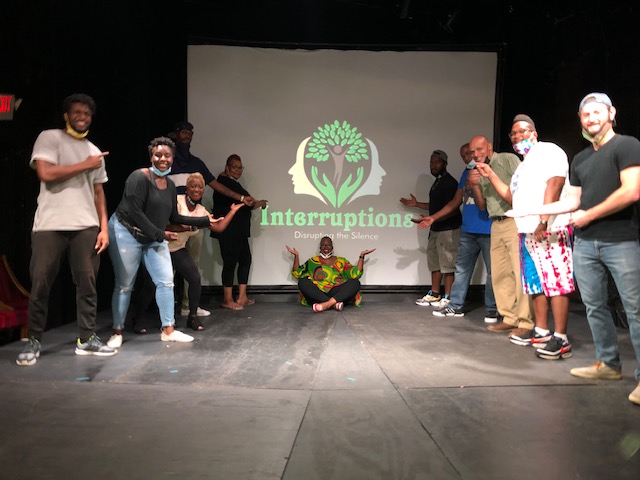
Baobab Tree Studios | Bregamos Community Theater | Arts & Culture | Theater | Black Lives Matter | Rev. Odell Montgomery Cooper
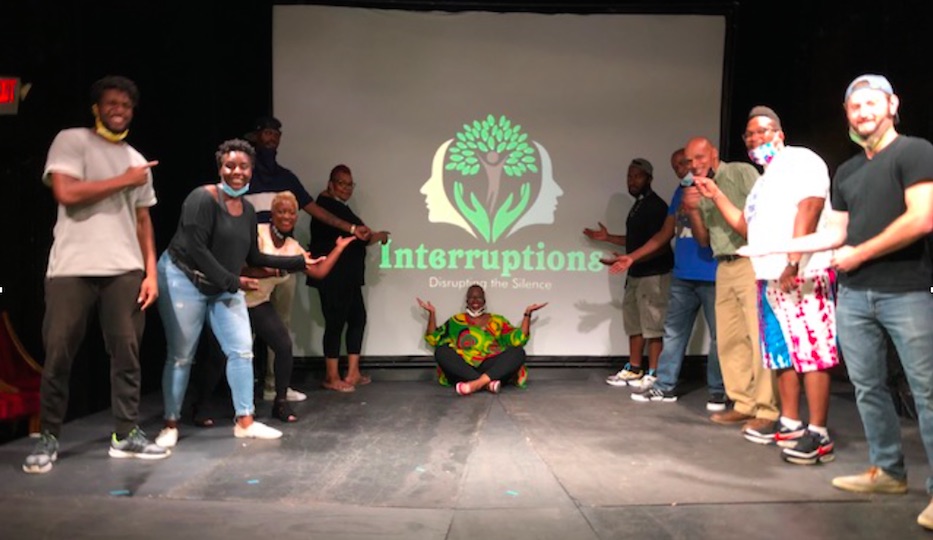
| The cast and crew at Bregamos Community Theater this week. Photos courtesy of Rev. Odell Montgomery Cooper. |
A woman takes center stage, eyes wide and trusting. Something sits heavy in her arms and legs, the way she holds her neck. Is it grief? Stress? She speaks: her son has been gunned down in an act of senseless violence. One year later, on what would have been his 26th birthday, she suffered a brain aneurysm that almost ended her life. And yet she is still here, standing before the audience.
The woman is the Rev. Odell Montgomery Cooper, one of the artistic forces behind Interruptions: Disrupting The Silence as it films at Bregamos Community Theater this week. The work is based on Cooper’s life after the murder of her 25-year-old son Jonathan, who was shot to death on Dixwell Avenue four years ago, while he was stopped at a traffic light.
In the years since, Cooper has survived a brain aneurysm and used writing, faith, counseling, and fierce anti gun violence advocacy to address her own grief and trauma. The work is a collaboration with writer and director Ina Anderson, musical director Jonathan Quinn Berryman, writers and family members Jackie Cooper, Marcel Brown and Damar McArthur, and graduate student actors from the Yale School of Drama.
Jackie Cooper is Cooper’s daughter and Jonathan’s sister. Brown and McArthur were his best friends at Metropolitan Business Academy. They graduated together in 2010. After taping with Baobab Tree Studios, the work will premiere virtually September 5 and 6. Tickets are free; more information is available here.
“It’s been a journey of grief and trauma,” Cooper said in a recent episode of “Arts Respond” on WNHH Community Radio. “People needed to hear about trauma in their life, the way we carry grief, the impact of gun violence, so we’re telling that story.”
Interruptions was born a year and a half ago, after a chance meeting between Cooper and Berryman at a fundraiser for now-Mayor Justin Elicker. Cooper has known Berryman, who is the founder and director of the Heritage Chorale of New Haven, for years. Her kids sang under his direction when they were younger, and belonged to a choir at Varick AME Zion Church.
Cooper found herself telling Berryman her story, from the loss of her son through the aneurysm, which doctors did not expect her to survive. They gave her three days, then three months. She is still living.
She spoke about her Jonathan, a bright-eyed audio engineer and coffee shop manager who had moved to New York City in 2010, after graduating from Metropolitan Business Academy. The weekend he was killed, he’d come home to celebrate his cousin’s birthday. After celebrating, he’d texted his mom to say he was on his way home. Less than 90 minutes later, he was gone. The shooter, who pulled up beside him at a traffic light, had mistaken him for another Black man.
Berryman listened intently. When she finished, he urged her to find a way to get her story to the wider community.
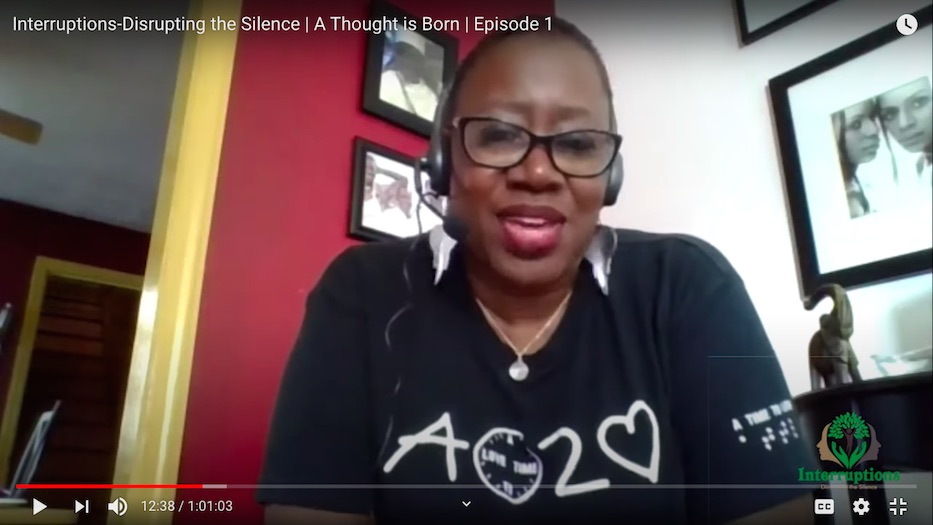
“Something said in me, ‘this story needs to be told,’” he recalled. “And Odell heard it, and she didn’t hear it. And I guess some greater power helped her to hear it again—more deeply—and we started. She convened us at her table and we started talking about what it could look like.”
That didn’t happen immediately. Cooper, who was carrying both grief and post-traumatic stress disorder, estimated that she took “about a year” until she was ready to sit down with Anderson and Berryman. In part, the decision came out of her realization that her grief was not hers alone—her son’s death had devastated members of her family and a larger community.
She and her daughter still shared a home, but had become like ships in the night. Her son’s best friends were still reeling from the hole left in their lives. All of them had taken their own personal journey to find counseling, which Cooper sees as still largely stigmatized in the Black community. When they did come to the table to work on Interruptions, the others often asked Cooper to leave the room, so that they could talk candidly without re-traumatizing her.
“It was a tough process,”McArthur said. “It was emotional, going down that road and having those conversations with Ms. Odell. You know, we were in high school. We had to share stories that—we were kids at the time. Having fun. Pranks. All things kids do. It was an emotional process … and I am super proud of how we all came together and got this organized while dealing with grief.”
It wasn’t met without suspicion, Brown added. Initially, he wasn’t sure how the play would take shape, or what power his voice would have. He chose to trust the process.
“When Ms. Odell came to us with this idea, we were a little skeptical about it,” he said. “We were like, ‘how is she gonna get this to move?’ We talked about different ideas. We talked about how we want to portray it. What to include, what not to include. To make sure messages don’t get lost in this. And just through the process, just checking in on each other.”
One by one, the four told stories about the son, brother, and friend that had been torn away from them. Brown and McArthur reminisced on high school, and the years following graduation during which they left New Haven and Hamden, but remained close. When Cooper was killed, McArthur was about to welcome his first baby, and had asked him to be the baby’s godfather. Brown was preparing to get engaged and wanted Cooper to be his best man.
In the hole that he left, the two tried to fill that empty space. Brown became the godfather to McArthur's child. McArthur prepped Brown before he walked down the aisle. The two feel his absence everywhere.
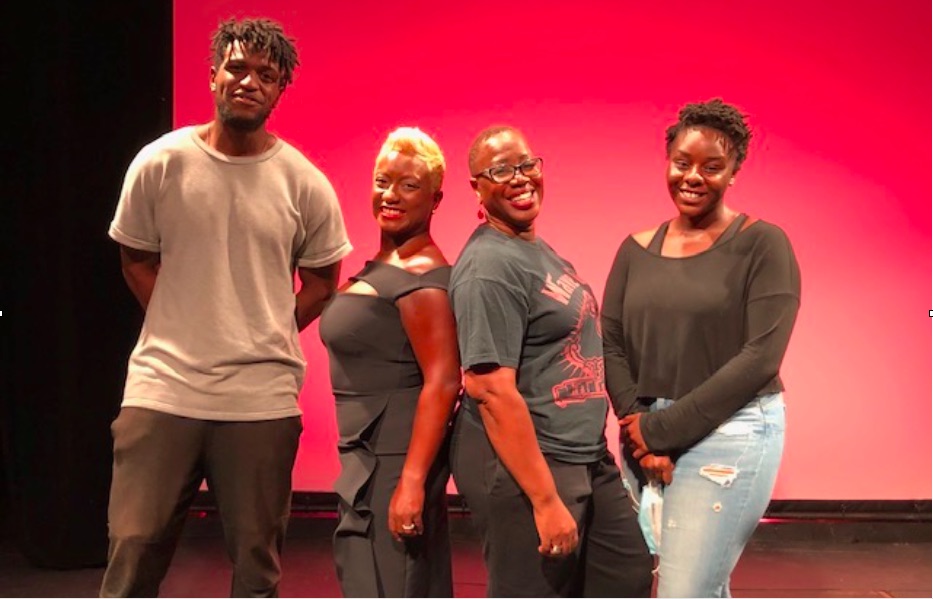
Cooper and her daughter also had different ways of seeing the big-hearted footprint Jonathan left on the world, and the way they moved through it without him. Because Cooper has struggled with writing since her aneurysm, she worked with Anderson and Berryman to dictate the stories.
She realized that “I know people” who could help, and watched as members of her village emerged from the woodwork to provide help with writing, then script development and production. In addition to the play, she has also penned a book of the same title.
“We talk about what we went through, the characteristics that we were feeling,” she said. “My character, my daughter’s character, and Marcel’s character all talk about that journey, and then how we finally decided to go to counseling. That was painful. Every time we rehearse it, it’s painful to hear and relive. But it’s important to tell.”
The four also spoke extensively about the “silences” and stigmas each of them faced, some of which also appear in a series of podcasts from Baobab Tree Studios. Cooper, who is an ordained minister, recalled returning to her church family and being told that she simply needed to pray harder and more often. She returned to work, and found colleagues who were impatient with her grief.
She kept herself from asking for help, afraid that it would be perceived as a sign of weakness. She said she could feel the expectation “that I would be the strong Black woman,” even as she navigated unspeakable loss with her family.
She also saw an alarming trend around her: other families, almost always Black, were reeling from the same kind of loss across New Haven and Hamden. When those deaths happened, she watched newspaper and television reports that spun grief, PTSD, and multigenerational trauma into the myth of “Black -on-Black crime” instead of talking about systemic racism and economic deprivation.
Four years after her son's murder, she has continued to watch New Haven mourn Black boys and men whose lives are taken much too soon by gun violence. Between the time of her WNHH interview and filming, 28-year-old Dayshon Smith became the latest casualty on Rosette Street.
“Part of the silence we need to disrupt is this notion that Black people being killed is normal,” Berryman said. “That’s a great challenge, and we need to be more proactive and more active about recognizing that that is not normal.”
Around her, her daughter and son’s friends—who she considers her adopted children and often refers to as “the fellas”—were experiencing some of those same silences. They too felt like people were asking them to move on too prematurely, with phrases like “how are you feeling today?” and “God needed another angel.” No one talked about counseling.
No one wanted, it seemed, to hear how they were actually doing, because the answer was a matter of survival. Cooper now owns a shirt adorned with the phrase “Ask Me Another Question” as a response to people who “were saying all the wrong things,” even if they had good intentions.
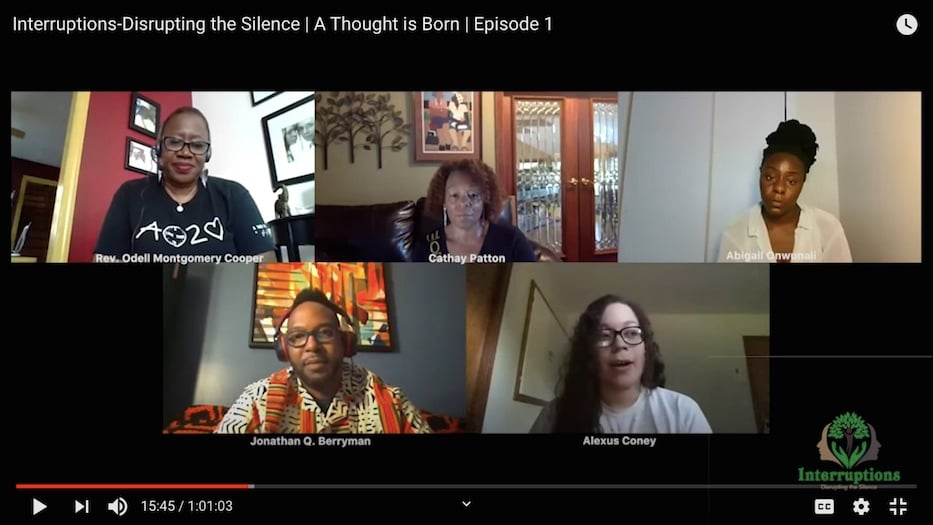 As Interruptions became a script, scenes emerged and fell into place. Cooper wrote through her experience of getting the call from police, just as Brown and McArthur recalled getting a call from Cooper hours later. She wrote about lying in the hospital after her aneurysm, where she realized that “I had to fight for my life. And I had to give up the way that I was carrying my son’s grief so that I could fight for my life.”
As Interruptions became a script, scenes emerged and fell into place. Cooper wrote through her experience of getting the call from police, just as Brown and McArthur recalled getting a call from Cooper hours later. She wrote about lying in the hospital after her aneurysm, where she realized that “I had to fight for my life. And I had to give up the way that I was carrying my son’s grief so that I could fight for my life.”
All four of them discussed the journey to counseling, which they now urge friends, family members, and colleagues to tap into. McArthur said he hopes others hear the story, and feel less afraid to seek help themselves. Berryman likened Cooper’s process to Johannes Brahms’ Ein deutsches Requiem, which he wrote in a state of deep grief after his mother’s death in 1865. The grief doesn’t disappear. It becomes something different, communicable and enveloping for all who are willing to listen.
“So he turned his grief into a masterwork,” Berryman said. “And to a certain extent, that’s what this story is. To me, Interruptions 2020 is the Raisin In The Sun of yesteryear, in how it speaks to what’s really going on in such an honest way that the world has to pay attention.”
“As a person of faith, we have to believe that things happen in God’s own time and God’s own way,” he later added. “It does not mean that we have to be happy about it. And acknowledging that is part of disrupting the silence. There’s just some stuff that happens to us. We don’t know why. We just don’t like it. But unless we deal with that, it will kill us.”
Initially, the work was slated for performances at Bregamos Community Theatre, in the city’s Fair Haven neighborhood. Cooper, who wears many hats in the production, had been fundraising and writing grant proposals for months. When COVID-19 hit, Interruptions lost almost all of its funding, after organizations assumed the show could not go on without a physically staged production and an audience to see it.
Cooper pushed back. She explained that COVID-19 was—and continues to be—an evolving part of the trauma that Black people experience every day, at rates that are much higher than their white counterparts. Then she reimagined the performance.
In the late spring, writers and producers held auditions over Zoom, which they have also been using for podcasts, rehearsals, and check-in meetings. Cooper marveled at how actors have risen to the challenge, studying the real-life people that they are depicting.
Yale School of Drama student Abigail C. Onwunali, who was recently in a.k. payne’s Where Pathways Meet, plays Cooper’s daughter. Malachi Beasley, also at the Yale School of Drama, plays Brown. McArthur, who now lives in North Carolina, does the voiceovers for Jonathan Cooper.
There are also New Haven voices, because “this is a New Haven and Hamden story,” said Cooper. Funeral director Howard K. Hill plays himself as he delivers a speech on what it is like to watch the toll of gun violence on families, communities, and even funeral homes. So does Cooper, who stepped in unexpectedly after an actress had a family emergency.
She said reliving that grief amidst the trauma of COVID-19—including the call she received that her son was gone—feels both heavy and necessary. Because the aneurysm has made it impossible to remember lines, she relies on a fact that also pains her: she knows the story better than anyone else. The team has been working at Bregamos this week, while maintaining social distancing at all times and mask wearing when characters are off set.
“This is a dark story to tell,” she said. “A painful story to tell. But we have to tell it. Because if I can’t return to work, and if my doctor says to reinvent myself, to do something different, I have a passion in ministry to help others. So I am here to disrupt the silence, and to help others see themselves in this journey of grief, and trauma.”
“Whether it’s from a gunshot, COVID-19, a loss of a job, where your life has been interrupted, your life is not over,” she continued. “There is a way that you can find something inside of you to reinvent yourself. To keep living and to do something different.”
To listen to the episode of "Arts Respond," click on the Soundcloud link above or visit the Facebook Live video. Tickets, which are free, and more information on Interruptions: Disrupting The Silence are available here.

